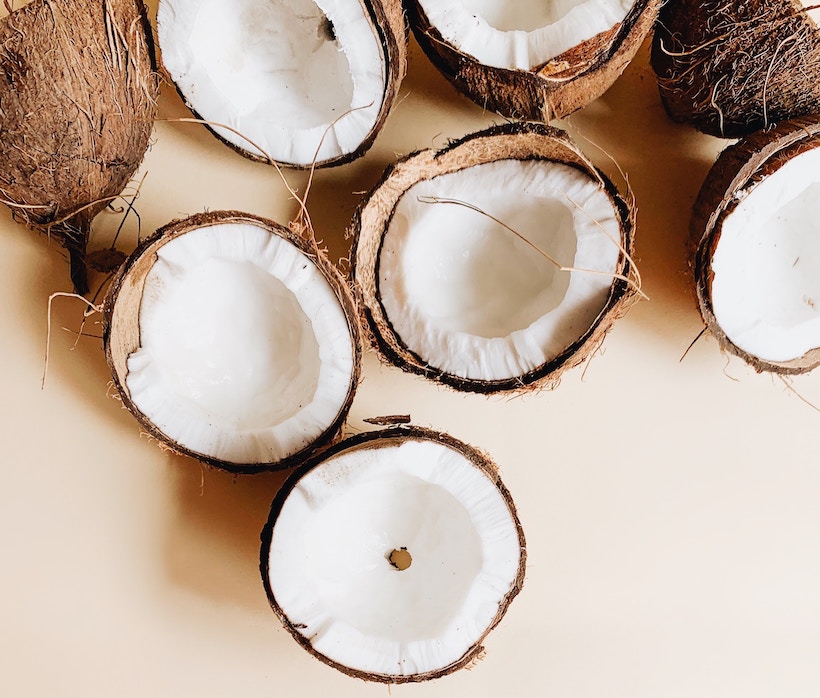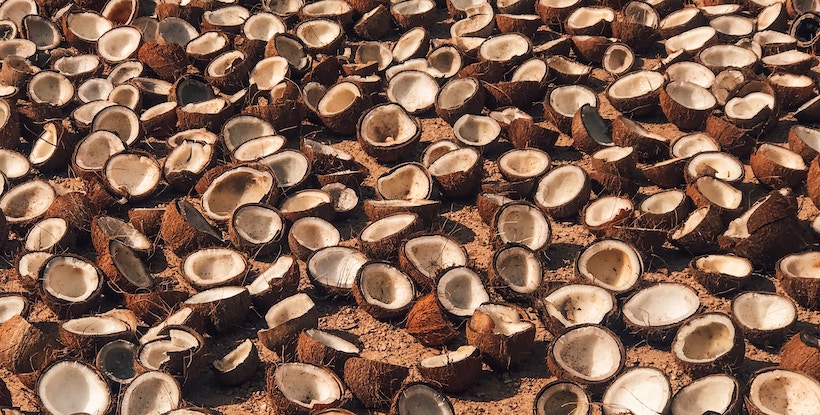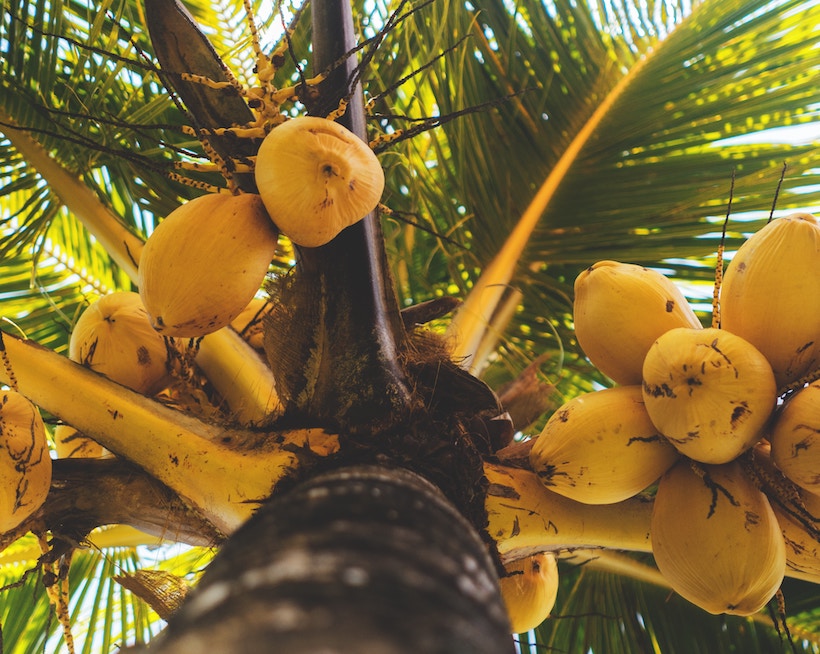It's not only by chance that coconut oil has emerged as a widespread phenomenon. As you might expect, there are some mighty powerful and compelling reasons for its notable rise in popularity.
Incredibly versatile, coconut oil is equally at home for cooking and baking – and even in the production of creams and ointments for topical use. Even more than that, while the jury is still out on the total picture, the health effects of coconut oil that we can prove are shaping up to be remarkable.
Let's take a look inside the coconut today and trace what we can prove and what we can't when it comes to coconut oil.

Coconut oil is an edible substance made from mature coconuts that grow from the coconut palm (Cocos Nucifera). The oil is usually extracted from the kernel (otherwise known as meat) portion of the coconut fruit – which is also suitable for direct human consumption. Coconuts are extremely resilient – use a coconut opener to safely open one if you fancy doing it yourself.
There are a few ways to extract oil from the coconut, but the two most common are:
The coconut kernel contains an elevated amount of saturated fats that slow down its oxidizing process, making coconut oil very resistant to rancidification. As a result, coconut oil has a high shelf life no matter which form you purchase it in.
Of course, commercial coconut oil quality varies quite a bit. However, the study linked above showed that copra oil has a shelf life of around 9 - 15 months. Virgin coconut oil had a shelf life of almost five years.
This incredible shelf life makes coconut oil suitable for cooking as well as medicinal and even industrial uses.

There are two main ways to obtain coconut oil from coconut kernel or meat: the dry process and the wet process. The dry process involves the use of solvents, resulting in a high-protein, high-fiber mash that is typically used for animal feed. Often, unfortunately, the copra that goes into dry pressed oil is often somewhat rotten – think coconuts that are months old by the time they are processed.
Because dry-made coconut oil is less well-suited for human consumption, I'll skip it. Instead, let's focus on wet-made coconut oil, the type that is typically used by humans – and you usually find on your supermarket shelf.
Often, the wet extraction process begins by boiling the coconut kernel. However, modern methods use a combination of centrifuges and various pre-treatments to break up the matter and separate the oil from the fiber. After this, a second process (such as distillation) is often used to separate the oil from the fibrous matter further. Then, if desired, the pure oil can be processed even more to obtain refined, bleached, and deodorized oils.
Apart from oil, there are particular food and other products that can be obtained from coconuts. The most popular, without a doubt, is coconut water, a delicious drink that is obtained directly from the ripe coconut fruit (and a rumored hangover salve – maybe useful after you had too much red wine?).
There are many others, however: coconut butter, coconut sugar, coconut flour, and desiccated coconut are all probably found on your supermarket's shelves.
Medium-chain triglycerides (or MCTs) are fats that contain a few fatty acid tails of 6-12 carbon atoms in length. MCTs have shown many benefits to human health.
Some studies suggest that MCTs have antimicrobial properties, can help digestive problems, seizures, and other issues. As if that wasn't enough, ample evidence shows MCTs can help with weight loss and athletic performance.
More than that, MCTs have been linked to many uses against specific conditions. For example, there is evidence that medium-chain triglycerides can prevent the breakdown of muscle mass in critically ill patients.
Going a step further, some scientists claim that the compound can help prevent and control certain types of seizures in children. It should be noted, though, that some of these claims still need substantial research to verify – coconut oil and MCTs are promising, but we can't yet be sure of their unalloyed benefits.

Unfortunately (especially in Western society), most people's diets include mostly long-chain triglycerides (LCTs) and fats in the form of omega-6. Omega-6 fats aren't bad, per se, but they do cause inflammation when unbalanced with other types of fat.
(And, yes, our omega-6 consumption is unbalanced!)
The medium-chain triglycerides (MCTs) found in coconut oil are funny - they don't follow the same digestive path of long-chain triglycerides, nor are they like the shorter chain triglycerides found often in dairy.
In fact, unlike LCTs, MCTs can be easily absorbed by your body directly in your liver. This disposition to being absorbed quickly results in these triglycerides being immediately converted to energy or turned into ketones (an alternative source of energy that is more efficient than our standard fuel, glucose).
Well, I had to talk about MCTs first – coconut oil contains medium-chain triglycerides in spades. However, they aren't the only exciting substances you'll get in your coconut oil jar.
While MCTs steal the show, coconut oil contains more of a fatty acid known as lauric acid. Lauric acid is a fatty acid with a 12-carbon atom chain that tends to follow a digestion path closer to long-chain fatty acids. We aren't quite sure its effects on health – studies suggest it increases good cholesterol – but lauric acid also might have a beneficial impact on skin conditions such as acne.
Something that you often hear with coconut oil? There's a decent amount of vitamin E and other healthy tocopherols in coconut. One hundred grams of fresh coconut oil has ~0.2 milligrams of vitamin E.
It's an interesting aside, but currently, the RDA for Vitamin E is around 15 milligrams – you'd need to eat quite a lot of coconut oil to hit your target.
Since coconut oil is such a popular topic for food, health, and skin, let's take a look at some of the proven benefits of the substance.

Considering that it contains more than 90% saturated fat, it may seem counter-intuitive to hear that coconut oil may be good for the heart. It turns out, the opinions on the matter are still very much divided.
Proponents of coconut oil for heart health have two solid arguments on their side
Of course, you want to balance this information against the knowledge that coconut oil is high in saturated fat.
It may yet turn out that we were wrong about saturated fat, and it isn't as bad as we once thought. However, for now – note the American Heart Association still warns to keep saturated fat low. You'll have to make your own decision on this as the jury is still out

Often, manufacturers of topical creams and ointments that include coconut oil cite the substance's antibacterial and antiviral properties as its main benefits. Recent studies show that there's something to it!
Some of the fatty acids abundant in coconut oil are capable of activating immune responses that play a crucial part in bacterial clearance and the fighting of disease. In particular, these acids seem to be effective against common pathogens such as Salmonella, Campylobacter, Shiga toxin-producing E. coli, and others.

Taking into account that the medium-chain fatty acids found in coconut oil are easy to absorb and digest, it's no wonder that some people who suffer gut conditions choose to consume it regularly. There might be more, however – studies have shown that coconut oil is capable of fighting and even deactivating specific pathogens that commonly cause gut problems, including H. Pylori, Candida Albicans, and Giardia.
In particular, coconut oil has been proven to be effective against yeast infections (Candidiasis) when used either alone or as an integral part of a treatment plan.

As I just mentioned, Candida Albicans is amongst the pathogens that can be fought using coconut oil as a part of a treatment plan. That is very important for immunodeficient patients who are affected by the pathogen. Because their condition already weakens their bodies, immunodeficient patients often react negatively to various front line antifungals usually used to fight the pathogens.
It was found that capric acid found in coconut kernel directly attacks the cytoplasm of the Candida pathogen, causing it to become disorganized – destroying it with high efficiency. Because coconut oil achieves these results without further weakening patients, the substance can be an excellent helper for treating Candidiasis in patients with AIDS and other immune diseases.

Several studies support the notion that coconut oil is beneficial for oral health. Primarily, this is due to one of the fatty acids that are found in the substance: lauric acid.
Once the body digests it, lauric acid converts into monolaurin, a chemical that is great for killing bacteria, fungi, and viruses in the body. In particular, the substance has been proven to be effective against the type of bacteria in the mouth that contribute to bad breath, tooth decay, and gum disease.

Among its various benefits, a ketogenic diet can be effective in the fight against refractory epilepsy.
MCT consumption has been proven to reduce seizure frequency and severity while enhancing tolerability to the condition. The substances responsible for these benefits are MCTs – very abundant in coconut oil.

Amyotrophic Lateral Sclerosis (ALS), an unfortunate condition sometimes styled as Lou Gehrig's Disease, causes progressive muscle weakness, paralysis, and death. Apart from producing pain and discomfort, this condition causes a reduction in the quality of life in patients and limits their daily activities.
Luckily, studies have shone a ray of hope on the issue by showing that a ketogenic diet high in coconut oil may significantly slow down the progression of weakness. Also, it may help reduce the rate of spinal cord motor neuron loss, enhancing mobility, and even injury recovery rates.

Over the past few years, there have been several reports that suggest the MCFAs and MCTs found in coconut oil can help naturally preserve insulin response in patients that have type 2 diabetes. The compounds are capable of achieving this by protecting the patient's metabolism from lipotoxicity, resulting in a drop in the kind of insulin resistance that characterizes type 2 diabetes.
Amazingly, the compounds found in coconut oil are capable of improving insulin sensitivity even in patients without caloric restrictions (although a restricted diet is undoubtedly an essential element of treatment). This property might make it worthwhile for doctors to include the substance as part of the treatment for people living with diabetes.

As I already mentioned, coconut oil has been shown to help increase HDL (good cholesterol) levels in the blood. Before going any further, though, I think it's important to clarify the difference between this type of cholesterol and LDL (bad cholesterol):
Also known as "bad" cholesterol, low-density lipoprotein makes up the majority of cholesterol in your blood. Because it tends to remain in the blood without the possibility of elimination, high quantities of this cholesterol type are theorized to raise your chances of heart attack and stroke.
LDL comes in a few types, and scientists are still sorting out how good of a marker it is. However, Lp(a) (Lipoprotein(a)), a variant of LDL, is almost certainly a gloomy marker for all sorts of negative circulatory and heart-related ailments.
No matter what type of diet you have, your levels of high-density lipoprotein (or "good cholesterol") will always be lower than those of LDL. Even in moderate amounts, however, this type of cholesterol can help your metabolism by absorbing LDL and carrying it back to the liver. There, the organ will break it down to flush it out of the body.
For that reason, having healthy amounts of HDL in your body can significantly lower the risk of heart disease and stroke.

The human liver has various functions that make it a critical organ in your body. Without a doubt, the most important ones are the breaking down of certain substances, the balancing of your metabolism, and the removal of toxins. Sadly, this process can be difficult and stressful if your living with a condition which requires you to take medicines to keep your health in check.
Various studies have suggested that the use of virgin coconut oil is effective in preventing some forms of liver damage.
In the most successful studies, virgin coconut oil protected rats from liver damage from paracetamol (acetaminophen). In these studies, liver damage was noticeably reduced after a couple of weeks of continuous administration of the substance.
You should note, though, that these are preliminary studies and more research on the subject is required.

For centuries, virgin coconut oil has been used by people in tropical regions to treat skin-related inflammation and irritation problems. However, until recently, there hadn't been any comprehensive studies of the substance's anti-inflammatory properties.
Luckily, various new studies have established a clear relationship between the use of virgin coconut oil and anti-inflammatory activities. It should be noted, however, that as usual you should wait for further studies to confirm or deny those properties before going all in on coconut.
Unfortunately, not everything is positive in the world of coconut oil research.
Several adverse effects have been identified as a result of excessive coconut oil consumption. The most common ones are the following:
This one almost goes without saying – so I'm here to say it anyway. One of the most common arguments against the use of coconut oil is that it is high in calories.
This is a fact: Coconut oil contains 9 calories per gram, tying it with other fats as the most calorie-dense foods available. And – keeping in our earlier discussion on saturated fat – over 90 percent of the fat is saturated.
Some official recommendations suggest that all fats should come in at around 30% of your daily consumption. This means that you can still use coconut oil for cooking (or consume it directly) – in moderation.
As I just mentioned, coconut oil is very high in saturated fats. Some historical studies linked excessive saturated fats with specific diseases and conditions – the worst of which directly affect your heart and blood vessels. Taking that into account, medical experts advise adults not to consume more than 10 percent of calories in the form of saturated fats.
At this point, however, I should again note: there are studies that contradict the notion that saturated fats such as those found in coconut oil are harmful for your heart. In fact, studies have provided evidence that this type of fat is not associated with CVD, CHD, ischemic stroke, or type 2 diabetes.
Despite the counterbalancing evidence, in its latest publication on the subject, AHA reiterated its stand against the consumption of saturated fats.
Saturated fats are one of the controversial areas I guarantee we'll be talking more about in the coming years. I wouldn't necessarily be afraid one way or the other yet, but certainly, the jury is still out. Please cautiously make your own decisions here.
If you are worried about your liver, take into account that several studies have linked the over-consumption of saturated palm oil fats with fatty liver syndrome.
In some studies, palm oil was shown to cause this condition. Because of its similarity to palm oil, coconut oil may also cause fatty liver when consumed in excessive amounts.
There is anecdotal evidence that coconut oil may cause digestive issues in some people.
In particular, patients who have ALS seem to be susceptible to diarrhea and other digestive problems when taking coconut oil as a part of their treatment. For others, it appears that quickly increasing usage is a problem, and tolerance builds over time – if you don't eat coconut oil often, you should scale up your usage gradually.
Some studies point out a suspected link between Cocamidopropyl betaine (CAPB) allergy and coconut-derived surfactants. However, these studies are not conclusive.

Apart from direct consumption or usage as a cooking oil, coconut oil can be beneficial when used in other ways. The most common are as follows:
As I previously mentioned, coconut oil has high concentrations of lauric acid. This type of acid can help improve hormonal and cellular health, making it great for preventing the loss of protein in the hair. Additionally, the substance's molecular structure allows it to penetrate hair in a way that other oils can't, resulting in quick and long-lasting results.
Likewise, coconut oil has been definitively proven to be beneficial for the skin. Its benefits come in various ways.
For one, the substance's antibacterial and antimicrobial properties help kill microorganisms responsible for causing conditions such as acne, cellulitis, folliculitis, and athlete's foot.
Additionally, coconut oil has been shown to improve the antioxidant status in your body, resulting in anti-inflammatory action. Furthermore, by increasing the levels of collagen in the body, the substance can help your body heal wounds quickly and efficiently.
As if all that wasn't enough, coconut oil works fantastically as a moisturizer!
As I previously mentioned, there have been several studies that speak to coconut oil's capability to improve oral health. However, this notion is everything but new. Other interesting evidence? There are oral hygiene practices involving coconut oil that have been around for centuries (if not millennia).
One of the most well-known dental practices with coconut oil is oil pulling, a method of Ayurvedic medicine that dates back 3000 years. It involves putting a small amount of coconut oil in your mouth and swishing it around for anywhere between 10 and 20 minutes. After that, you spit out the oil.
Despite being an ancient practice, oil pulling has recently found support in several modern studies. Coconut oil's antibacterial properties have been shown to be effective in reducing the count of Streptococcus mutans in human saliva. As a result, it is considered a safe and effective alternative to Chlorhexidine – a substance often used in mouthwash.

Okay, now turn the hard question on me: is coconut oil good for you?
The answer to this is complex. For one, the dietary effects of coconut oil in things like weight loss and exercise have not been conclusively proven. There are, however, many studies supporting the idea that coconut oil can be beneficial in these areas, primarily due to the medium-chain triglycerides in the substance. Considering the oil's undeniable nutrition benefits and its quick conversion into clean energy by the body, I lean towards the feeling that coconut oil is good for health.
When talking about the health effects of coconut oil, it is essential to mention the substance's proven anti-inflammatory, antiviral, and antibacterial properties. These properties make coconut oil a powerful ally in the fight against certain conditions. At the same time, it helps maintain the hygiene and general health of your hair, skin, and teeth. Considering that – when used topically – coconut oil is considered almost entirely harmless... it's hard to argue against its usage.
Taking everything into account, I am confident that coconut oil has definite benefits to your health in moderation. It is essential to remember that coconut oil should be only a fraction of your daily calorie intake. If used correctly, the substance can be a fantastic dietary supplement with various additional benefits to your health.
At any rate: keep an eye on the news to find out about the latest medical discoveries about coconut oil.
While the jury isn't fully back, things do seem to be shaping up in the coconut's favor.
I'll continue to enjoy my coconut oil, with its easy storage, its desirable properties for cooking, and its vast array of topical usages. How about you?
Great article Gerard. I am a big fan of ALL things coconut, especially when combined with chocolate!
I use coconut mostly for cooking but I also mix some with baking soda to brush my teeth with. I agree it certainly has many uses and despite any negative side effects, a jar will always be in my kitchen!